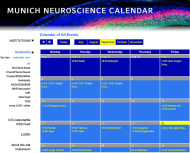Open PhD Positions available
3 PhD positions as part of interdisciplinary collaborations are available in Laura Busse’s group at the Department of Biology II of the LMU Munich.
07.01.2021
We study neural circuits of visual perception in awake, behaving mice, where we combine extracellular electrophysiological recordings with genetic tools for circuit manipulation. More information on the lab is available here.
The first position is part of the DFG-funded Collaborative Research Center Robust vision: Inference Principles and neural mechanisms. In collaboration with Philipp Berens (data analysis, University of Tübingen) and Thomas Euler (retinal imaging, University of Tübingen), the project builds upon Roman Roson*, Bauer* et al. (2019), and will investigate how feedforward, feedback, and neuromodulatory inputs dorsolateral geniculate nucleus (dLGN) of the thalamus shape visual representations. The project will include opportunities for in vivo extracellular recordings in mouse dLGN, optogenetic manipulations of cortico-thalamic feedback, and advanced modeling approaches (in Philipp Berens’ lab). The project requires strong experimental skills, a strong interest in computation, and the ability to work in a distributed team. A second, complementary PhD position based primarily in Tübingen will have a computational focus and will focus on modeling of the experimental findings.
The second position is also part of the DFG-funded Collaborative Research Center Robust vision: Inference Principles and neural mechanisms. In collaboration with Thomas Euler (retinal imaging, University of Tübingen), we will explore the visual input received by the mouse visual system under natural conditions and how such input is processed along key stages of the early visual system. The project continues from Qiu et al. (2020) and will include opportunities for performing recordings of the visual input encountered by mice under naturalistic conditions, statistical analysis of the recorded video material, and measurements of neural responses from mouse primary visual cortex in response to naturalistic movies. The project requires strong experimental skills, an interest in engineering and programming, and the ability to work in a distributed team. A complementary PhD position based primarily in Tübingen will closely collaborate on the development of the recording hardware and software, and focus on retinal aspects of the project.
The third position is part of the DFG-funded Priority Program Computational Connectomics and will be done in collaboration with Dr. Tatjana Tchumatchenko at the University of Bonn and Max Planck Institute for Brain Research in Frankfurt. The project combines questions from neurobiology and theoretical neuroscience. It will exploit simultaneous thalamic / cortical recordings and optogenetic manipulations to investigate how feedforward inputs and recurrent connectivity in the thalamocortical loop shapes population activity in the primary visual cortex. The successful candidate will perform extracellular recordings and optogenetics in mice, use quantitative data analysis and collaborate with our theory partner in Bonn/Frankfurt on theoretical network analyses. The project requires a strong interest in visual circuit neurophysiology and theoretical modeling, and the ability to work in a distributed team.
For all projects, programming skills and a strong interest in data analysis are necessary. Interested candidates are welcome to establish contact via email to busse@bio.lmu.de.
Applications will need to go through the LMU Graduate School of Systemic Neuroscience (GSN online application). The deadline for applications is February 15.





